Analysis of Culturally Responsive Negotiation Strategies Report
VerifiedAdded on 2023/06/04
|8
|1531
|263
Report
AI Summary
This report examines culturally responsive negotiation strategies, drawing on articles and case studies to analyze how cultural dimensions influence negotiation styles. The report explores key concepts such as power distance, individualism, long-term orientation, monochronic and polychronic time orientations, and the purpose of negotiation. It analyzes the differences between Chinese and American negotiation styles, highlighting the impact of Hofstede’s cultural dimensions. The report also considers the importance of cultural awareness and the ability to adapt negotiation approaches to different cultural contexts. Finally, it references a case study involving Woolworths and its transition to reusable bags. The analysis provides insights into effective cross-cultural communication and negotiation techniques for achieving successful outcomes in diverse business environments.

Culturally response negotiation strategy 1
Name:
Course:
Professors name:
Institution:
Name:
Course:
Professors name:
Institution:
Paraphrase This Document
Need a fresh take? Get an instant paraphrase of this document with our AI Paraphraser
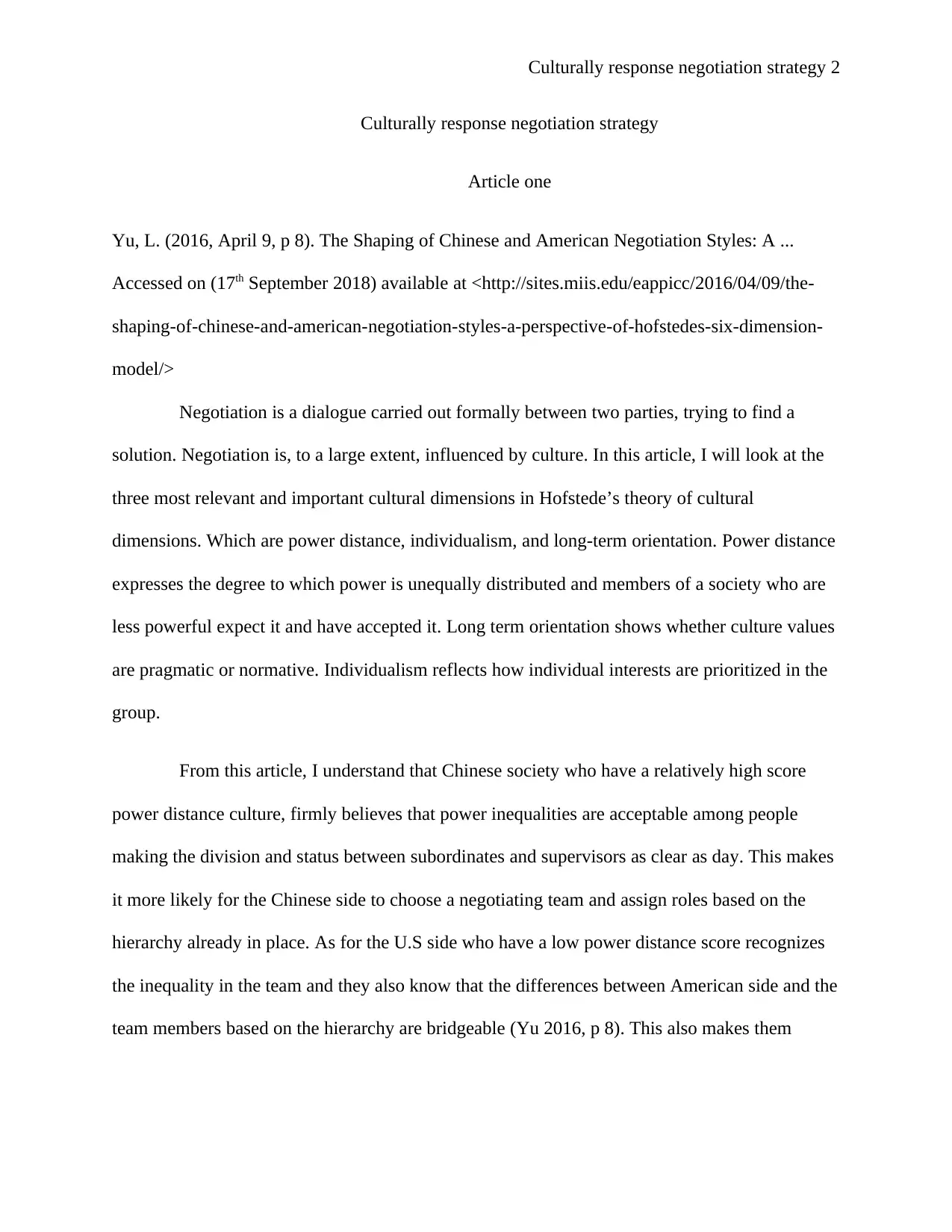
Culturally response negotiation strategy 2
Culturally response negotiation strategy
Article one
Yu, L. (2016, April 9, p 8). The Shaping of Chinese and American Negotiation Styles: A ...
Accessed on (17th September 2018) available at <http://sites.miis.edu/eappicc/2016/04/09/the-
shaping-of-chinese-and-american-negotiation-styles-a-perspective-of-hofstedes-six-dimension-
model/>
Negotiation is a dialogue carried out formally between two parties, trying to find a
solution. Negotiation is, to a large extent, influenced by culture. In this article, I will look at the
three most relevant and important cultural dimensions in Hofstede’s theory of cultural
dimensions. Which are power distance, individualism, and long-term orientation. Power distance
expresses the degree to which power is unequally distributed and members of a society who are
less powerful expect it and have accepted it. Long term orientation shows whether culture values
are pragmatic or normative. Individualism reflects how individual interests are prioritized in the
group.
From this article, I understand that Chinese society who have a relatively high score
power distance culture, firmly believes that power inequalities are acceptable among people
making the division and status between subordinates and supervisors as clear as day. This makes
it more likely for the Chinese side to choose a negotiating team and assign roles based on the
hierarchy already in place. As for the U.S side who have a low power distance score recognizes
the inequality in the team and they also know that the differences between American side and the
team members based on the hierarchy are bridgeable (Yu 2016, p 8). This also makes them
Culturally response negotiation strategy
Article one
Yu, L. (2016, April 9, p 8). The Shaping of Chinese and American Negotiation Styles: A ...
Accessed on (17th September 2018) available at <http://sites.miis.edu/eappicc/2016/04/09/the-
shaping-of-chinese-and-american-negotiation-styles-a-perspective-of-hofstedes-six-dimension-
model/>
Negotiation is a dialogue carried out formally between two parties, trying to find a
solution. Negotiation is, to a large extent, influenced by culture. In this article, I will look at the
three most relevant and important cultural dimensions in Hofstede’s theory of cultural
dimensions. Which are power distance, individualism, and long-term orientation. Power distance
expresses the degree to which power is unequally distributed and members of a society who are
less powerful expect it and have accepted it. Long term orientation shows whether culture values
are pragmatic or normative. Individualism reflects how individual interests are prioritized in the
group.
From this article, I understand that Chinese society who have a relatively high score
power distance culture, firmly believes that power inequalities are acceptable among people
making the division and status between subordinates and supervisors as clear as day. This makes
it more likely for the Chinese side to choose a negotiating team and assign roles based on the
hierarchy already in place. As for the U.S side who have a low power distance score recognizes
the inequality in the team and they also know that the differences between American side and the
team members based on the hierarchy are bridgeable (Yu 2016, p 8). This also makes them
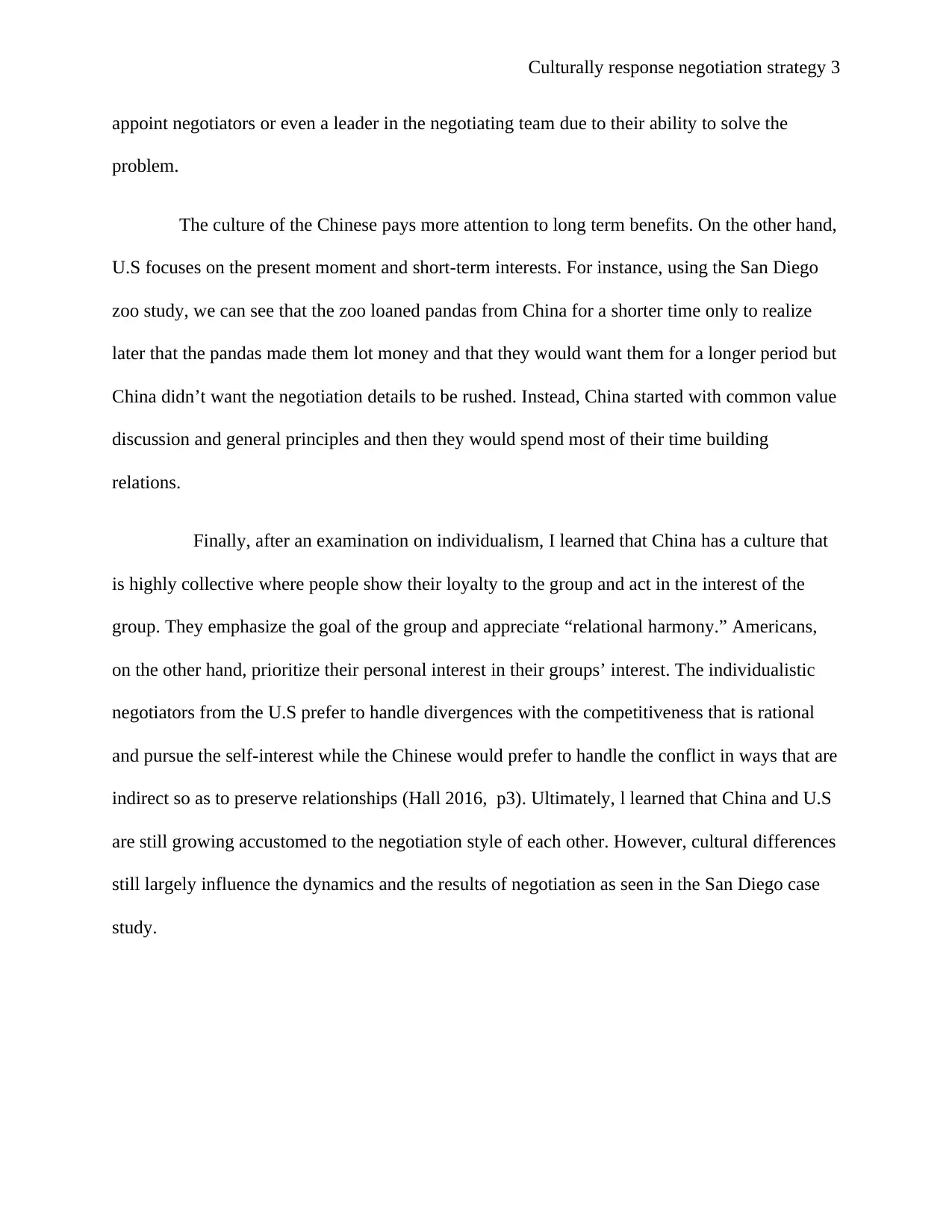
Culturally response negotiation strategy 3
appoint negotiators or even a leader in the negotiating team due to their ability to solve the
problem.
The culture of the Chinese pays more attention to long term benefits. On the other hand,
U.S focuses on the present moment and short-term interests. For instance, using the San Diego
zoo study, we can see that the zoo loaned pandas from China for a shorter time only to realize
later that the pandas made them lot money and that they would want them for a longer period but
China didn’t want the negotiation details to be rushed. Instead, China started with common value
discussion and general principles and then they would spend most of their time building
relations.
Finally, after an examination on individualism, I learned that China has a culture that
is highly collective where people show their loyalty to the group and act in the interest of the
group. They emphasize the goal of the group and appreciate “relational harmony.” Americans,
on the other hand, prioritize their personal interest in their groups’ interest. The individualistic
negotiators from the U.S prefer to handle divergences with the competitiveness that is rational
and pursue the self-interest while the Chinese would prefer to handle the conflict in ways that are
indirect so as to preserve relationships (Hall 2016, p3). Ultimately, l learned that China and U.S
are still growing accustomed to the negotiation style of each other. However, cultural differences
still largely influence the dynamics and the results of negotiation as seen in the San Diego case
study.
appoint negotiators or even a leader in the negotiating team due to their ability to solve the
problem.
The culture of the Chinese pays more attention to long term benefits. On the other hand,
U.S focuses on the present moment and short-term interests. For instance, using the San Diego
zoo study, we can see that the zoo loaned pandas from China for a shorter time only to realize
later that the pandas made them lot money and that they would want them for a longer period but
China didn’t want the negotiation details to be rushed. Instead, China started with common value
discussion and general principles and then they would spend most of their time building
relations.
Finally, after an examination on individualism, I learned that China has a culture that
is highly collective where people show their loyalty to the group and act in the interest of the
group. They emphasize the goal of the group and appreciate “relational harmony.” Americans,
on the other hand, prioritize their personal interest in their groups’ interest. The individualistic
negotiators from the U.S prefer to handle divergences with the competitiveness that is rational
and pursue the self-interest while the Chinese would prefer to handle the conflict in ways that are
indirect so as to preserve relationships (Hall 2016, p3). Ultimately, l learned that China and U.S
are still growing accustomed to the negotiation style of each other. However, cultural differences
still largely influence the dynamics and the results of negotiation as seen in the San Diego case
study.
⊘ This is a preview!⊘
Do you want full access?
Subscribe today to unlock all pages.

Trusted by 1+ million students worldwide
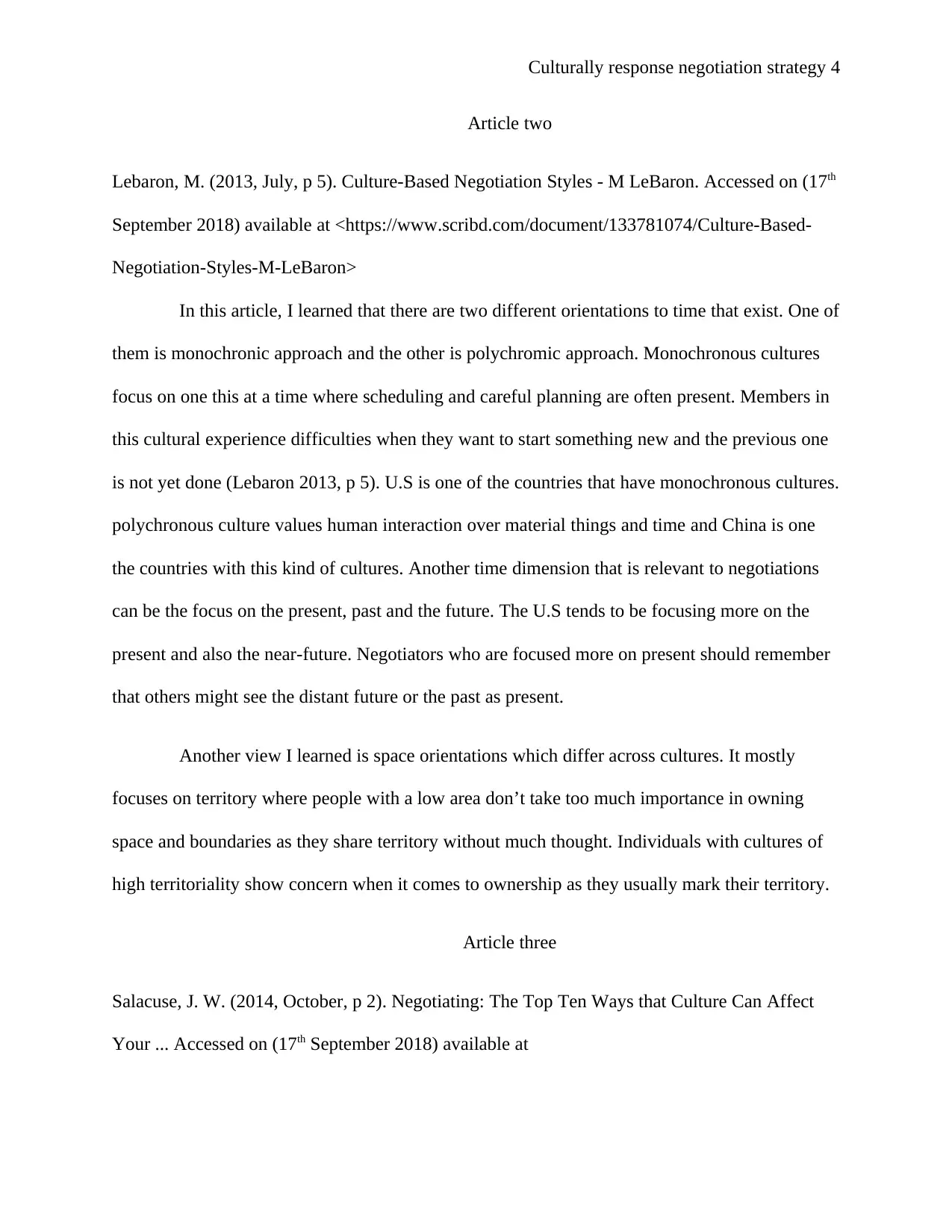
Culturally response negotiation strategy 4
Article two
Lebaron, M. (2013, July, p 5). Culture-Based Negotiation Styles - M LeBaron. Accessed on (17th
September 2018) available at <https://www.scribd.com/document/133781074/Culture-Based-
Negotiation-Styles-M-LeBaron>
In this article, I learned that there are two different orientations to time that exist. One of
them is monochronic approach and the other is polychromic approach. Monochronous cultures
focus on one this at a time where scheduling and careful planning are often present. Members in
this cultural experience difficulties when they want to start something new and the previous one
is not yet done (Lebaron 2013, p 5). U.S is one of the countries that have monochronous cultures.
polychronous culture values human interaction over material things and time and China is one
the countries with this kind of cultures. Another time dimension that is relevant to negotiations
can be the focus on the present, past and the future. The U.S tends to be focusing more on the
present and also the near-future. Negotiators who are focused more on present should remember
that others might see the distant future or the past as present.
Another view I learned is space orientations which differ across cultures. It mostly
focuses on territory where people with a low area don’t take too much importance in owning
space and boundaries as they share territory without much thought. Individuals with cultures of
high territoriality show concern when it comes to ownership as they usually mark their territory.
Article three
Salacuse, J. W. (2014, October, p 2). Negotiating: The Top Ten Ways that Culture Can Affect
Your ... Accessed on (17th September 2018) available at
Article two
Lebaron, M. (2013, July, p 5). Culture-Based Negotiation Styles - M LeBaron. Accessed on (17th
September 2018) available at <https://www.scribd.com/document/133781074/Culture-Based-
Negotiation-Styles-M-LeBaron>
In this article, I learned that there are two different orientations to time that exist. One of
them is monochronic approach and the other is polychromic approach. Monochronous cultures
focus on one this at a time where scheduling and careful planning are often present. Members in
this cultural experience difficulties when they want to start something new and the previous one
is not yet done (Lebaron 2013, p 5). U.S is one of the countries that have monochronous cultures.
polychronous culture values human interaction over material things and time and China is one
the countries with this kind of cultures. Another time dimension that is relevant to negotiations
can be the focus on the present, past and the future. The U.S tends to be focusing more on the
present and also the near-future. Negotiators who are focused more on present should remember
that others might see the distant future or the past as present.
Another view I learned is space orientations which differ across cultures. It mostly
focuses on territory where people with a low area don’t take too much importance in owning
space and boundaries as they share territory without much thought. Individuals with cultures of
high territoriality show concern when it comes to ownership as they usually mark their territory.
Article three
Salacuse, J. W. (2014, October, p 2). Negotiating: The Top Ten Ways that Culture Can Affect
Your ... Accessed on (17th September 2018) available at
Paraphrase This Document
Need a fresh take? Get an instant paraphrase of this document with our AI Paraphraser
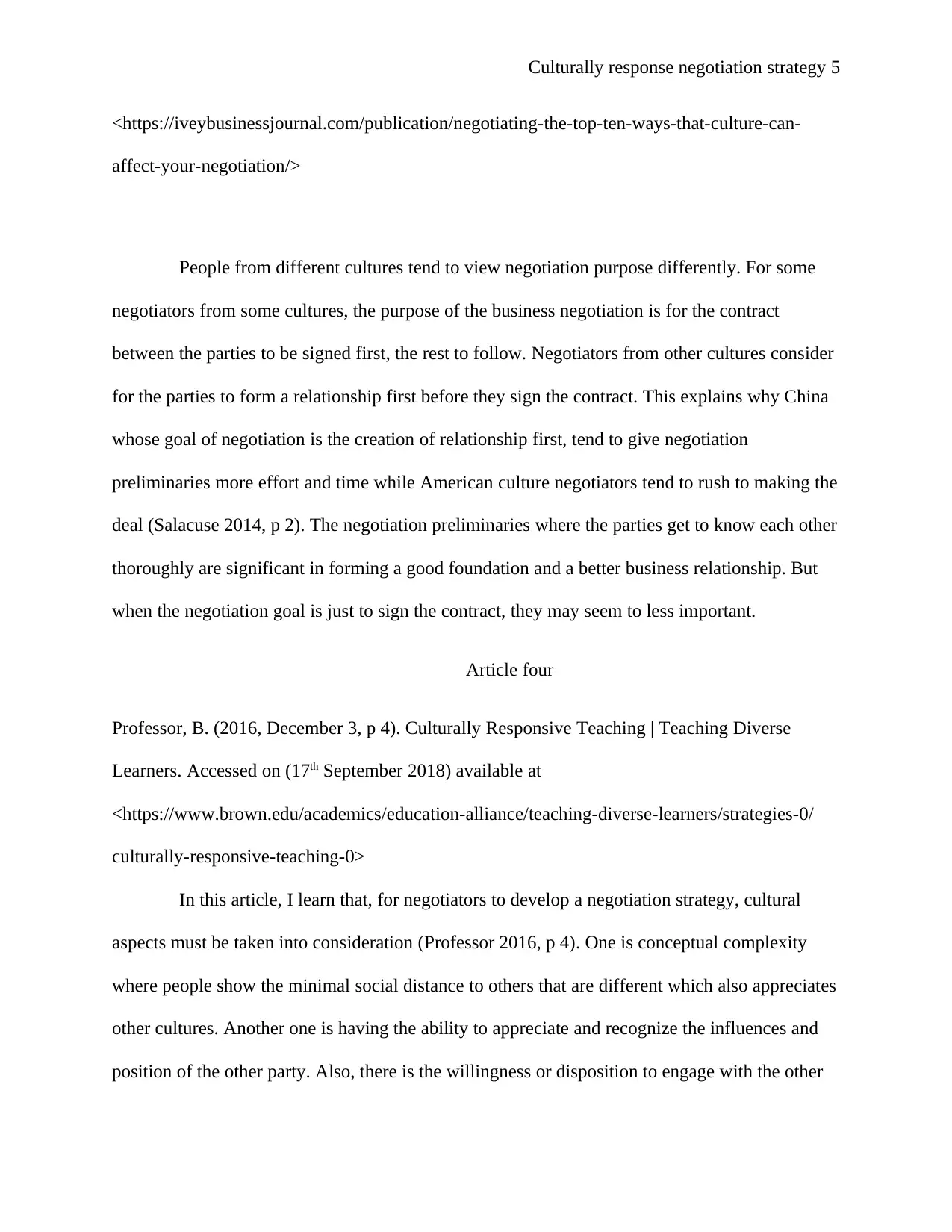
Culturally response negotiation strategy 5
<https://iveybusinessjournal.com/publication/negotiating-the-top-ten-ways-that-culture-can-
affect-your-negotiation/>
People from different cultures tend to view negotiation purpose differently. For some
negotiators from some cultures, the purpose of the business negotiation is for the contract
between the parties to be signed first, the rest to follow. Negotiators from other cultures consider
for the parties to form a relationship first before they sign the contract. This explains why China
whose goal of negotiation is the creation of relationship first, tend to give negotiation
preliminaries more effort and time while American culture negotiators tend to rush to making the
deal (Salacuse 2014, p 2). The negotiation preliminaries where the parties get to know each other
thoroughly are significant in forming a good foundation and a better business relationship. But
when the negotiation goal is just to sign the contract, they may seem to less important.
Article four
Professor, B. (2016, December 3, p 4). Culturally Responsive Teaching | Teaching Diverse
Learners. Accessed on (17th September 2018) available at
<https://www.brown.edu/academics/education-alliance/teaching-diverse-learners/strategies-0/
culturally-responsive-teaching-0>
In this article, I learn that, for negotiators to develop a negotiation strategy, cultural
aspects must be taken into consideration (Professor 2016, p 4). One is conceptual complexity
where people show the minimal social distance to others that are different which also appreciates
other cultures. Another one is having the ability to appreciate and recognize the influences and
position of the other party. Also, there is the willingness or disposition to engage with the other
<https://iveybusinessjournal.com/publication/negotiating-the-top-ten-ways-that-culture-can-
affect-your-negotiation/>
People from different cultures tend to view negotiation purpose differently. For some
negotiators from some cultures, the purpose of the business negotiation is for the contract
between the parties to be signed first, the rest to follow. Negotiators from other cultures consider
for the parties to form a relationship first before they sign the contract. This explains why China
whose goal of negotiation is the creation of relationship first, tend to give negotiation
preliminaries more effort and time while American culture negotiators tend to rush to making the
deal (Salacuse 2014, p 2). The negotiation preliminaries where the parties get to know each other
thoroughly are significant in forming a good foundation and a better business relationship. But
when the negotiation goal is just to sign the contract, they may seem to less important.
Article four
Professor, B. (2016, December 3, p 4). Culturally Responsive Teaching | Teaching Diverse
Learners. Accessed on (17th September 2018) available at
<https://www.brown.edu/academics/education-alliance/teaching-diverse-learners/strategies-0/
culturally-responsive-teaching-0>
In this article, I learn that, for negotiators to develop a negotiation strategy, cultural
aspects must be taken into consideration (Professor 2016, p 4). One is conceptual complexity
where people show the minimal social distance to others that are different which also appreciates
other cultures. Another one is having the ability to appreciate and recognize the influences and
position of the other party. Also, there is the willingness or disposition to engage with the other
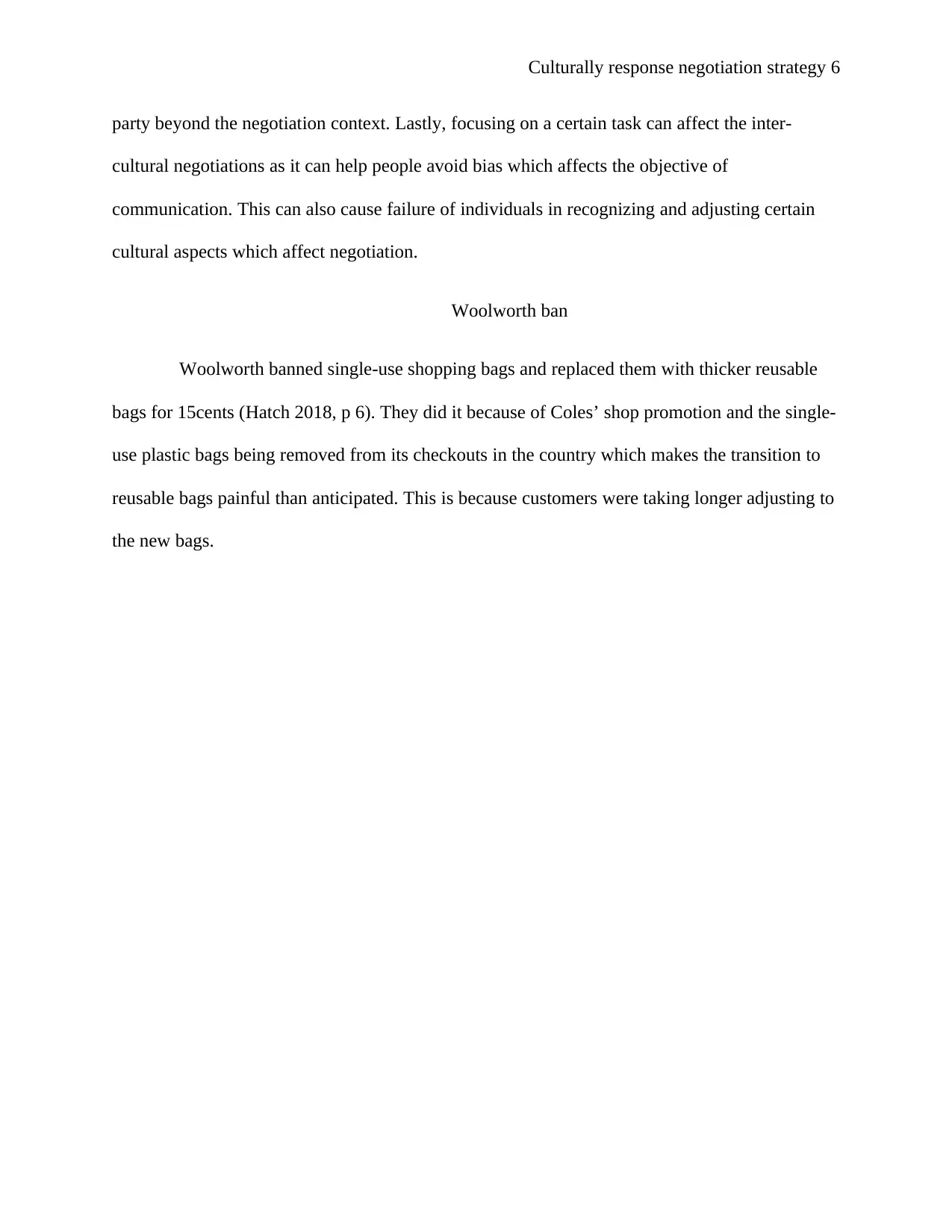
Culturally response negotiation strategy 6
party beyond the negotiation context. Lastly, focusing on a certain task can affect the inter-
cultural negotiations as it can help people avoid bias which affects the objective of
communication. This can also cause failure of individuals in recognizing and adjusting certain
cultural aspects which affect negotiation.
Woolworth ban
Woolworth banned single-use shopping bags and replaced them with thicker reusable
bags for 15cents (Hatch 2018, p 6). They did it because of Coles’ shop promotion and the single-
use plastic bags being removed from its checkouts in the country which makes the transition to
reusable bags painful than anticipated. This is because customers were taking longer adjusting to
the new bags.
party beyond the negotiation context. Lastly, focusing on a certain task can affect the inter-
cultural negotiations as it can help people avoid bias which affects the objective of
communication. This can also cause failure of individuals in recognizing and adjusting certain
cultural aspects which affect negotiation.
Woolworth ban
Woolworth banned single-use shopping bags and replaced them with thicker reusable
bags for 15cents (Hatch 2018, p 6). They did it because of Coles’ shop promotion and the single-
use plastic bags being removed from its checkouts in the country which makes the transition to
reusable bags painful than anticipated. This is because customers were taking longer adjusting to
the new bags.
⊘ This is a preview!⊘
Do you want full access?
Subscribe today to unlock all pages.

Trusted by 1+ million students worldwide
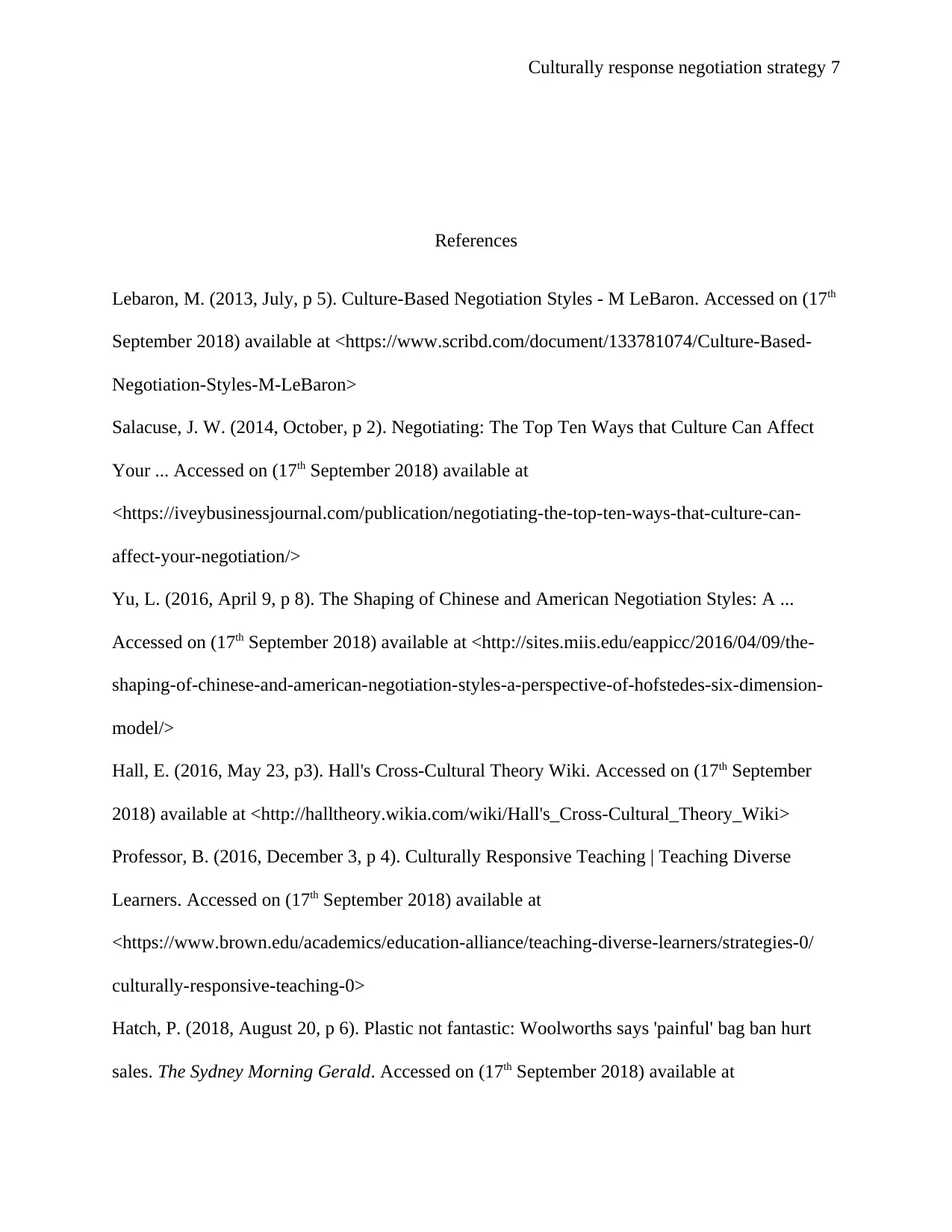
Culturally response negotiation strategy 7
References
Lebaron, M. (2013, July, p 5). Culture-Based Negotiation Styles - M LeBaron. Accessed on (17th
September 2018) available at <https://www.scribd.com/document/133781074/Culture-Based-
Negotiation-Styles-M-LeBaron>
Salacuse, J. W. (2014, October, p 2). Negotiating: The Top Ten Ways that Culture Can Affect
Your ... Accessed on (17th September 2018) available at
<https://iveybusinessjournal.com/publication/negotiating-the-top-ten-ways-that-culture-can-
affect-your-negotiation/>
Yu, L. (2016, April 9, p 8). The Shaping of Chinese and American Negotiation Styles: A ...
Accessed on (17th September 2018) available at <http://sites.miis.edu/eappicc/2016/04/09/the-
shaping-of-chinese-and-american-negotiation-styles-a-perspective-of-hofstedes-six-dimension-
model/>
Hall, E. (2016, May 23, p3). Hall's Cross-Cultural Theory Wiki. Accessed on (17th September
2018) available at <http://halltheory.wikia.com/wiki/Hall's_Cross-Cultural_Theory_Wiki>
Professor, B. (2016, December 3, p 4). Culturally Responsive Teaching | Teaching Diverse
Learners. Accessed on (17th September 2018) available at
<https://www.brown.edu/academics/education-alliance/teaching-diverse-learners/strategies-0/
culturally-responsive-teaching-0>
Hatch, P. (2018, August 20, p 6). Plastic not fantastic: Woolworths says 'painful' bag ban hurt
sales. The Sydney Morning Gerald. Accessed on (17th September 2018) available at
References
Lebaron, M. (2013, July, p 5). Culture-Based Negotiation Styles - M LeBaron. Accessed on (17th
September 2018) available at <https://www.scribd.com/document/133781074/Culture-Based-
Negotiation-Styles-M-LeBaron>
Salacuse, J. W. (2014, October, p 2). Negotiating: The Top Ten Ways that Culture Can Affect
Your ... Accessed on (17th September 2018) available at
<https://iveybusinessjournal.com/publication/negotiating-the-top-ten-ways-that-culture-can-
affect-your-negotiation/>
Yu, L. (2016, April 9, p 8). The Shaping of Chinese and American Negotiation Styles: A ...
Accessed on (17th September 2018) available at <http://sites.miis.edu/eappicc/2016/04/09/the-
shaping-of-chinese-and-american-negotiation-styles-a-perspective-of-hofstedes-six-dimension-
model/>
Hall, E. (2016, May 23, p3). Hall's Cross-Cultural Theory Wiki. Accessed on (17th September
2018) available at <http://halltheory.wikia.com/wiki/Hall's_Cross-Cultural_Theory_Wiki>
Professor, B. (2016, December 3, p 4). Culturally Responsive Teaching | Teaching Diverse
Learners. Accessed on (17th September 2018) available at
<https://www.brown.edu/academics/education-alliance/teaching-diverse-learners/strategies-0/
culturally-responsive-teaching-0>
Hatch, P. (2018, August 20, p 6). Plastic not fantastic: Woolworths says 'painful' bag ban hurt
sales. The Sydney Morning Gerald. Accessed on (17th September 2018) available at
Paraphrase This Document
Need a fresh take? Get an instant paraphrase of this document with our AI Paraphraser

Culturally response negotiation strategy 8
<https://www.smh.com.au/business/companies/plastic-not-fantastic-woolworths-says-painful-
bag-ban-hurt-sales-20180820-p4zyn5.html>
<https://www.smh.com.au/business/companies/plastic-not-fantastic-woolworths-says-painful-
bag-ban-hurt-sales-20180820-p4zyn5.html>
1 out of 8
Related Documents
Your All-in-One AI-Powered Toolkit for Academic Success.
+13062052269
info@desklib.com
Available 24*7 on WhatsApp / Email
![[object Object]](/_next/static/media/star-bottom.7253800d.svg)
Unlock your academic potential
Copyright © 2020–2026 A2Z Services. All Rights Reserved. Developed and managed by ZUCOL.





